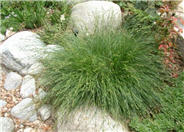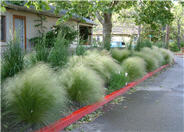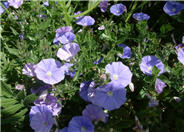
Common name:California Meadow Sedge
Botanical name:Carex pansa
This native Carex can be successfully used as a lawn substitute but requires significant water to obtain good coverage. Once coverage is reached, water can be reduced and maintenance is close to zero. Unmowed, the plant can be used effectively in a variety of conditions and will reach a height of 6" or under and spreads up to 2' by rhizomes.

Common name:Iceberg Floribunda Rose
Botanical name:Rosa 'Iceberg'
This is a shrub rose (there are climbing varieties) with an abundance of fragrant, medium sized, white blooms. It is one of the most popular roses and very tough.

Common name:Mexican Feather Grass
Botanical name:Nassella tenuissima
This ornamental grass grows to 2' tall. It goes partially dormant during the summer but green in spring and fall. It prefers a sunny, well drained site. This plant can be invasive in some areas, so use caution. To keep reseeding to a minimum, drip irrigation will be best. Cut back in early spring to remove dormant foliage and dried seed heads. It can also tolerate dry shade. It grows to 10" wide and is the finest textured of the ornamental grasses.

Common name:Dwarf Morning Glory
Botanical name:Convolvulus sabatius
Convolvulus sabaticus is a perennial that grows 1'-2' high, with branches that spread to 3' or more. It produces blue to lavender flowers with blooms of 1"-2" wide. The soft, evergreen leaves are 1/2" to 1.5" long.
Sustainable Landscaping Fundamentals
Sustainable landscaping is a term coined to mean sensible landscape practices that work within the limits of the Eco-system. This means within the limits of your local rainfall, soil conditions and sun patterns.
Click in the green box for more information
| Designer: Dustin Gimbel | Prarie Strip |
Photographer: GardenSoft |
Soils and Compost:
Incorporate compost 6" into your soil to retain water, reduce compaction, feed earthworms, and provide valuable nutrients to your plants.
Water Saving Tip:
Integrated Pest Management:
Remove irrigation water and fertilizer from areas where you don't want weeds to grow.
